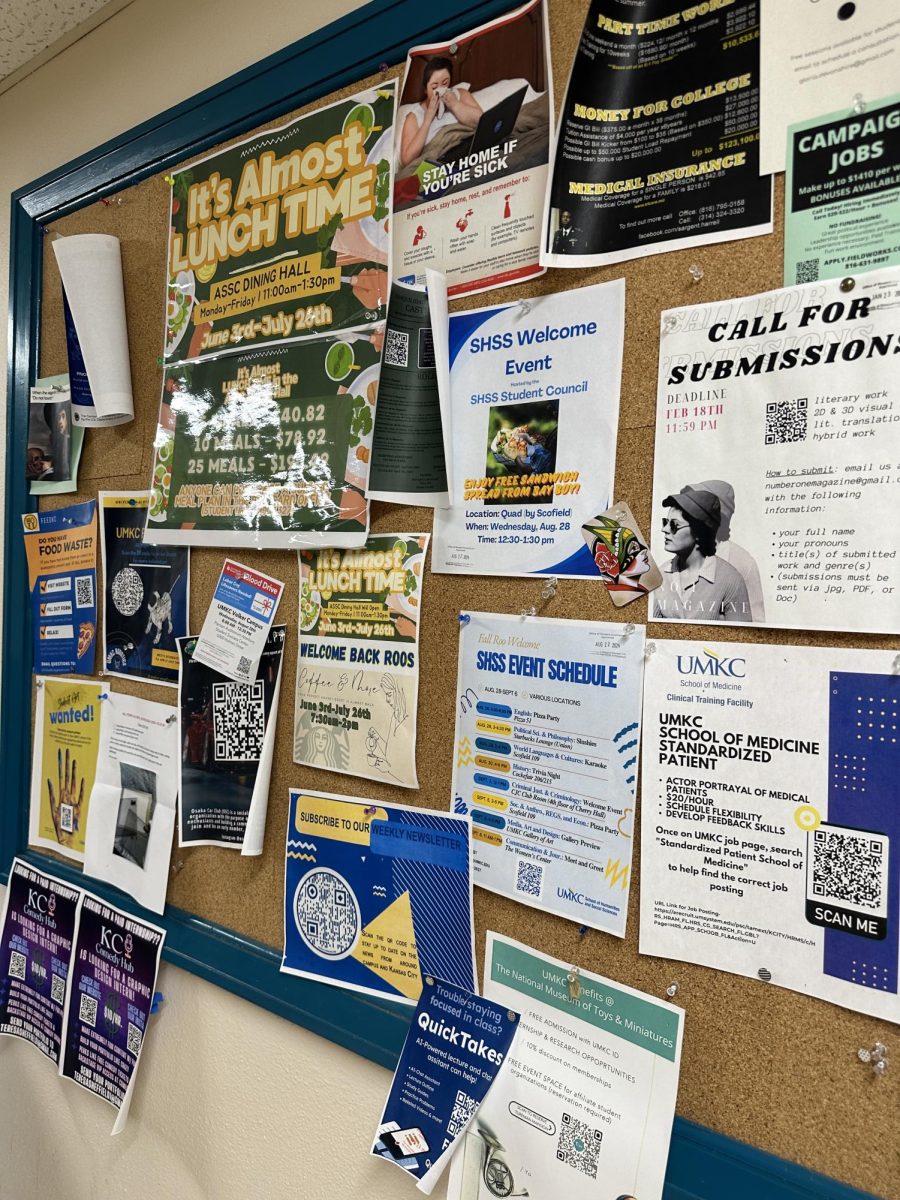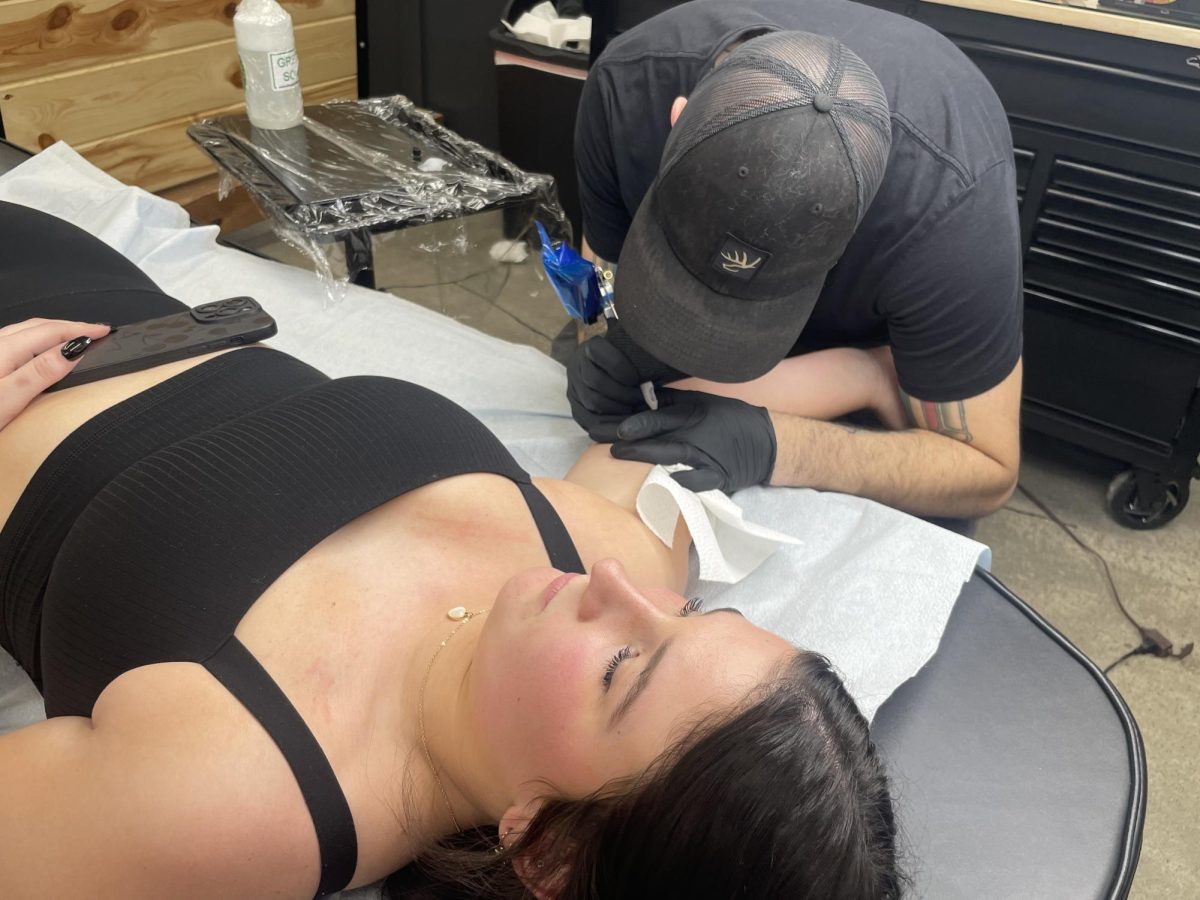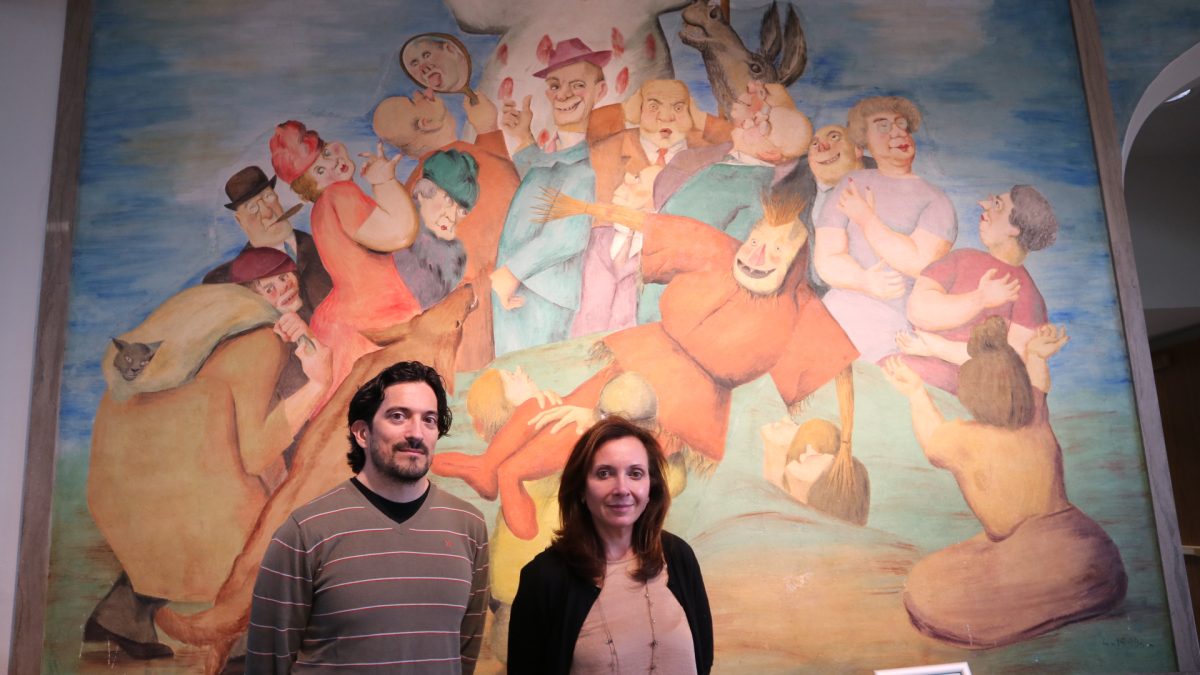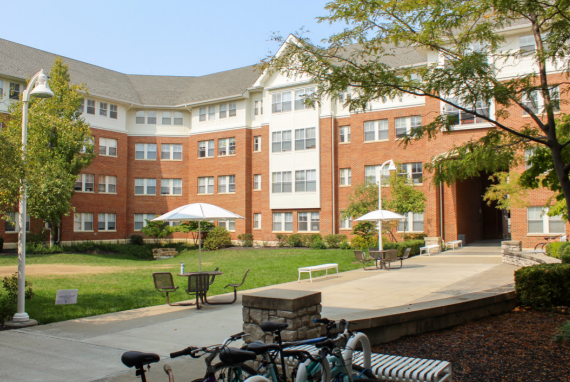Note: The following conversations, which came from extensive verbal conversations with the candidates, have been edited for clarity and brevity.
Q. Why are you running for SGA President?
Justice:
Why I’m running is primarily to double down on the progress and prosperity that’s already happened in our first term. I don’t know if many are aware, but before my time as president, there was no SGA. I mean, it was in shambles. My first term was revamping and establishing an SGA. There’s so much still to be done. I’ve been a president for the year, so I know what the problems are. I know what the electorate wants and what the students want.
Daphne:
I have been at UMKC for three years now. I have been involved in several things, such as orientation, campus ambassador, residential and different organizations around UMKC.
I’ve worked with prospective students, transfer students, [and] current students, but I’ve never actually met and had to work with students who are currently here without me doing that orientation experience. I help them get to UMKC, but once they’re here, it’s like we let go. So I want to take their perspective and their lens and their voice to help not just me, but anyone who is on the SGA board, [to] improve the school as much as we can.
So it’s not a matter of: “Do I want more people to know me?” It’s really strictly just: “I want to help students the best way I can.” If I’m gonna hear people complain about it, why not do something about it?
Brandon:
I’m running for SGA president because I want to make SGA more transparent, more accessible to students, and I want to redefine the focus of SGA. I think that we have a lot of opportunities within student government to make positive changes for students. However, I think that we have to make sure we’re communicating with students when we’re considering changes, especially when we’re talking about changes to their fees. I think the way that the current proposed fee referendum has kind of crept into the conversation is not the way SGA should be doing business. I think that they should plan more ahead of time when they want to pass fee increases and they need to get the word out to the student body better. I don’t think they’re doing that right now. And I think I could do a better job.
Q. What makes you stand out from the other candidates? Why are you the best fit for SGA President?
Justice:
I think I have, without a doubt, the most experience being one year into my presidency, and then also with my last university as vice president. Two years before that, I was a senator and even chair of the state and local government committee.
I have SGA experience. I know how to change the system and change things like that. I know how to represent the constituency and actually change things. I’m not here to just be present. You could look at my history, all the other universities. I’ve actually added huge pieces of legislation and made huge policy changes. I’ve always loved the school, and I want to continue that here and make UMKC better than when I came into it.
Daphne:
I have been in a lot of leadership roles. I’ve always taken ownership of errors and learned from them. I have so much passion for UMKC. It’s never-ending. And I think passion goes a long way whenever you want to help people, especially in a school where there are so many people. What helps me stand out is the leadership of passion.
Brandon:
I think I’m the best fit because I have a unique combination of experience and perspective to bring to the table. I’ve been at UMKC for about three years. I started in the fall of 2017. And those three years have given me a lot of positive memories with a lot of wonderful people.
They’ve also taught me what needs to change on campus in order to make things better for students. During my time on campus, I’ve worked as a student lobbyist representing students in Jefferson City, [and] I’ve done a lot of work registering students to vote on campus as well. I think that in order to make positive changes within SGA, we need some new leaders, some new leadership. And I think I have what it takes.
Q. What are the issues you are focusing on in your campaign?
Justice:
My number one policies are parking reform, expanding our diversity spaces, “New Food New Hours,” and also expanding counseling services. So just different avenues of resources for students. I have a lot of connections in the community with actually doing that. A lot of these solutions don’t always have to be put on the backs of students, there are different and creative ways. I feel the other candidates don’t have the same kind of name recognition or kind of connections in the community to do that.
Daphne:
Our first main point is Virago. The origin of meaning is a woman of strength and spirit and is a female warrior. The term feminist has turned into a negative term. And Virago has also been turned to a negative term because women have tried to push the boundaries and be leaders.
I want not only just women or men, but anyone of any gender identity to feel like they can be empowered just as much as anyone else. We want to push the boundaries on that.
Our second point is Civitas, which means community. We want to build a better community, not just within UMKC but also with Kansas City itself. We call ourselves Kansas City’s college, but there is a lack of connection with the city itself. Also community within Volker and the Hospital Hill campus. We’re all the same students. We also want to help bridge communities between our commuter students and our students that live on campus. We are a commuter campus. And for some reason, we either don’t accept it or we accept it, but we don’t want to do anything about it. We see it as a negative. Commuter students come from all places around different schools, different parts of the country. And for some reason, we don’t use the abilities that they have and the uniqueness that they bring to the campus. Definitely helping transfer students and commuter students have a platform so they can speak on what the issues are for those students.
Our third point is Valentar, which means strong voice. And to sum that up, we want to be an open-door policy as SGA. We want students to know what’s going on. We want to have a biweekly newsletter on Fridays. That would be awesome for SGA to have something so the students can see what we’re doing, what we’re talking about.
Our fourth point is Auxilium, which means support. So supporting not only our families and support systems as well as our international students and our English second language students. Also help support our transfer students, again, helping their process be easier. We can help them feel closer to a community by just talking to them and making them feel like they’re a part of the campus.
Lastly, we have Vetera, which means traditions. Everyone wants to create traditions at UMKC, but no one actually establishes them or keeps them moving on. It’s a way to feel connected, to create traditions and tell people the history of UMKC. Like Founder’s Week. I feel like it should be a lot bigger than it is. You decided to come to UMKC and you should be a lot more excited about it, but you don’t know the foundation of how it was built in the first place.
Brandon:
I’ve already talked about transparency and accountability, so another really important issue I want to talk about is resources on campus for students. When we are talking about resources, the conversation doesn’t just need to be, “Oh, let’s figure out how to get them more stuff.” We also need to talk about how we make students aware of the existing resources that are already on campus. For instance, the food pantry is my favorite example.
I volunteered with them since I’ve started at UMKC. And it’s really hard for students to access the food pantry because they don’t know where it is. They don’t know when it’s open. And they don’t know that they’re eligible to take advantage of the services. And that’s an example that is relevant, not just with regards to the food pantry, but other on-campus services as well. So I think that’s really important, not just looking at how can we do more for students, but how can we make sure students know what we’re already doing for them.
Q. How do you plan to actually implement your campaign promises?
Justice:
In a way, I think it’s just with being a senator, and I have the Senate experience. I know how the legislature works. I have connections in the Senate. I think these big, bold pieces of legislation will be run with a president that not only sees this is a problem right now, [but also sees] it’s the point of the legislator to then act on those problems. You need to have good relations with people that are going to buy in and see the priority of things.
Daphne:
In order to implement things, we obviously have to explain them and tell people what they are. It’s 17,000 people who are going here: master’s students, undergrad students, international students. The way to implement things is to get people to feel passionate about the subjects and to get their ideas and get their opinions and get help. Some of the constituents feel like they don’t have the power to do anything. They’re just there. And that’s not what we want at all. We want them to know that we’re here trying to help you guys out and get your ideas so that we can tell the people that can meet with us.
Brandon:
I’d say there’s not just one silver bullet to answer that problem. It’s really more of a concentrated effort and making it a priority for SGA. SGA had an entire year to raise awareness of the food pantry. It’s just not a choice that they’ve chosen to make. SGA had an entire year to help register students to vote on campus. It’s just not a choice that they made to prioritize.
So that’s a start, right? Making it a priority. Once you’ve made it a priority, after that, it just becomes a matter of making sure you’re communicating with different leaders of student organizations on campus. Because if you’re a student, you go to class and then the only other degree of involvement with the university is going to be the different clubs that you’re a part of. It’s not just about visiting them in classrooms too but you also have to talk about the leaders of these different student organizations, making sure that they’re roped in on efforts to promote awareness. And once you have all these different people come to the table and commit to making this a priority, I think it will be really simple after that.
Q. What will be your number one priority if you are elected SGA President?
Justice:
Continuing on the progress. I think, without a doubt, we know what we’re doing. I know what I’m doing. I’ve been in this stuff for a year, and I would not be running if I felt that SGA could just sail on its own and do it. There are too many problems that have to be fixed. There has to be a lot more progress happening. And although the first term was not only tackling some of those and setting an agenda but then also revamping SGA, I wish this was my first election. I would be coming into a strong SGA that can then tackle those policies. But I’m at the place where, in regards to the other candidates, they’ve been here for two, three years. They’ve been here for a while. I’m just confused on why they’re now hopping in the race after SGA was built. Why did they not see it in tatters and say, “Hey, I’m going to pick up the mantle and I’m going to give them an SGA that their school deserves.”? Where have you guys been? And even with that, when I’ve called for appointments, volunteers or even Senate seats to be filled. Where were you guys, if you cared so much about SGA?
Daphne:
Giving the students a voice. Something that I didn’t have when I was little, something my family has never had in the United States is a voice. I have the opportunity and we have the ability to give people a platform, to give people a voice.
That is the number one thing for me, is for people to feel empowered to have a voice too.
Brandon:
If I had to be very concise about it, we’re going to do our best not just to help the student body, but to make sure that they feel heard. We’re not going to do things behind closed doors, and we’re going to make sure that if there are any changes coming in SGA, they know about them well ahead of time.
Q. How do you feel the current UMKC administration is treating students?
Justice:
I’m going to be completely honest. Upper administration, this is their full-time job. So we’ve done a lot of good things. And I will admit [upper administration] is very proud of me, but they are also very scared of me because they know that the students are 100% behind me and they don’t like a student body president that has a lot of power. We need to have that. I think without a doubt why I am seeking re-election is that there needs to continue to be a maverick in this position.
There needs to be someone that continues, if need be, to come out against upper administration. We even did it with the whole Chiefs parade thing. And I’m very proud of that. That was kind of the first instance where we did that. They said, we’re going to close half of the campus and we said no. We released a statement. The student body got behind it. The Kansas City Star ran an article on that and they walked their steps back. I know without a doubt no one else could do that. And that’s the importance of SGA, is advocating on behalf of students. So that was one example of us standing up to upper administration. We need to continue to have that.
Daphne:
I want to be honest, it always varies. The administration as a whole, I hope and pray that they’re always looking out for the students’ benefits, which is why I always give them a benefit of the doubt.
The people that I work with are great, and I’m not just saying that because they pay me. I mean that really, truly, I wouldn’t be in my four jobs if I didn’t love my four jobs. But I know and I believe that some people in higher administration have that passion for UMKC and have that need and have that want to help students.
I really have confidence in those people that no matter who comes in, no matter what their agenda is, they will prevail, and they will last longer than those who aren’t in it for the right reasons. I feel like if there was more transparency and education within everything, students not only would know more, but they might even have more of a voice to give more ideas.
This is our school and not their school. They’re here to help us, but if we don’t give them our voice, they’re just going to make decisions for us.
Brandon:
I think that the chancellor is doing a good job and being attentive to student needs on campus. Between the Roos for Mental Health initiative and the food task force that they recently created, I think he’s paying attention.
I think we need to be careful about not trying to reinvent the wheel with stuff. Like, we all know what the counseling center needs, right? They need money. You don’t need a task force to study that issue because that’s what they need. With the food pantry, it needs to be closer to campus.
You don’t necessarily need a task force to answer that question. So I think coming out and acknowledging some of the stuff that we already know to be true would be a good start. Also, the chancellor has really big ambitions for increasing the population of students on campus, so I think that you also need to keep in mind the strain that that will place on the existing facilities. And you need a plan in place to make sure we’re ready for that, which I think they’re working on.
ljk6f4@mail.umkc.edu








